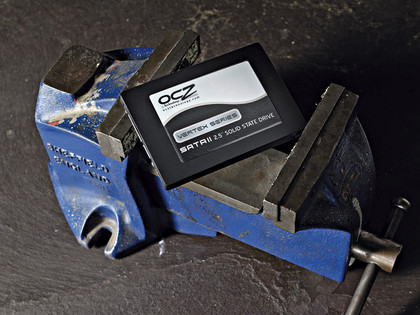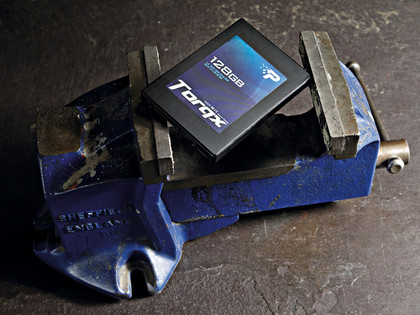6 super-fast SSDs to speed up your PC
Solid state of the art - all the fastest SSDs in one place

OCZ Vertex 120GB - £286
Score: 8/10
+ Indilinx controller's sequential throughput
+ Excellent real world performance
- No major weaknesses
- The minor matter of money
One of the very first things any student of SSDs learns is that, as a species, they're a thoroughly incestuous bunch. Not only are they all much more closely related under the skin than they seem on the surface, but you also get some pretty unholy backroom rebranding going on behind the scenes.
The reason, of course, is that there are only so many companies making the two key components required for solid state drives, namely flash memory and controller chips.
Get daily insight, inspiration and deals in your inbox
Sign up for breaking news, reviews, opinion, top tech deals, and more.
If you want to create an SSD, you'll need to go and pick those parts off the shelf. Thus we come to this eerily similar looking 120GB-ish SSD pairing from memory specialists OCZ and Patriot.
Normally, these outfits are arch enemies and yet these two drives share precisely the same 2.5-inch casing. Crack them open and sure enough you're met with identical PCB layouts and virtually identical components.
Hardware specs
Specifically, there's 128GB of Samsung manufactured NAND flash memory of the MLC variety, a 64MB SDRAM buffer and the all-important controller chip from Indilinx.
The latter is a relatively new and extremely welcome addition to the SSD ecosystem known as the 'Barefoot'.
Based on a programmable ARM processor core, it's claimed to reduce latency and increase bandwidth compared with older SSD designs based on both the ubiquitous JMicron controller and Samsung's first generation SSD controller chipset (though not necessarily the new Samsung kit as found in the Corsair and Samsung drives this month).
The upshot of all this includes some seriously juicy peak performance numbers.
Unsurprisingly, both OCZ and Patriot claim quite similar figures for maximum read performance at 250MB/s and 260MB/s respectively, the difference probably more reflecting measurement methods than any real deviation in the products themselves.
As for data write rates, both are said to top out at 180MB/s. Oh and for the record, these drives have the same capacity. OCZ prefers to go with a figure that more accurately reflects available storage after formatting.

Patriot Torox 128GB - £302
Score: 6/10
+ ARM-based Indilinx controller is promising
+ Huge 10 year warranty
- Catastrophic stuttering
- Poor performance across the board
Anywho, given the physical similarities you might expect them to deliver essentially the same performance. Fresh out of the box, they very probably do. However, that's not how we conducted our testing.
As you'll know from TechRadar's passim, one of the major problems with current SSDs involves long-term write performance. The root cause is derived from the way SSDs store data.
To cut a long story as short as possible, each flash memory chip is divided into 'blocks' and each block is in turn composed of 'pages'.
The specifics vary, but a typical example may be 4KB of data per page and 128 pages per block. In this scenario, a single block has a capacity of 512KB.
This matters because flash memory is read in pages and written in blocks. Of course, data doesn't always come in perfectly sized chunks, so blocks are often left only partially filled following a write cycle.
When the disk is relatively empty, unused blocks can be filled and performance does not suffer. However, as the drive fills up, data will eventually be written to partially used blocks.
Performance issues
When that happens, the entire block must be copied to the drive's cache memory before erasing and rewriting with a combination of the existing and new data. Needless to say, this process takes much longer than simply writing to an empty block.
Exactly how much longer depends on the elegance and efficiency of the algorithms coded into the drive's controller chip. In any case, the key issue is that drive performance drops off as the remaining blocks are filled.
However, the small size of SSDs means that in reality all available blocks will get filled quite rapidly in normal use, even if the drive is not packed with data. With that in mind, we first stuffed each SSD to the brim to ensure no blocks were left unused before formatting and installing a fresh copy of Windows 7.
Our results are therefore a guide to the performance you'll get over the lifetime of the drive as opposed to the initial out-of-the-box zippiness.
Surprisingly, they show a distinct difference between this apparently identical pairing. In fact, apart from similar peak read and write performance of around 250MB/s and 180MB/s respectively, there's a massive gulf in data throughput and it's the Patriot drive that's on the wrong end of the equation.
Our file decompression test is a typical example. The OCZ drive slices through it in just 40 seconds. The Patriot, meanwhile, requires a yawning two minutes and 56 seconds. It's also over three times slower during application installs and requires around twice as long to load a level of World in Conflict.
Patriot games
If that sounds bad, the subjective experience the Patriot Torqx serves up is even worse.
The drive that we tested suffered from catastrophic stutter. The stutter was bad enough to make simple things like navigating the Windows desktop a sluggish, infuriating process. Given the identical hardware and test platform, the only possible explanation for this annoying problem is firmware.
However, after flashing the drive with the latest firmware available from Patriot's website, the performance problems remain. If nothing else, the Torqx's performance problems are an object lesson in the importance of firmware.
Despite its virtually identical hardware, it's miles behind the OCZ drive with currently available firmware.
Indeed, even the Wiper.exe application created by Indilinx that supposedly removes deleted data from the memory blocks and therefore restores the performance of the drive to factory fresh levels had zero impact on the Torqx.
In the long run, it's likely that a firmware update will bring the Torqx level with OCZ's Vertex. But for now it's a pretty easy choice, especially given the latter's price advantage.
Current page: Mid-range SSDs from £286 to £302
Prev Page Low-end SSDs from £105 to £265 Next Page High-end SSDs from £492 to £508Technology and cars. Increasingly the twain shall meet. Which is handy, because Jeremy (Twitter) is addicted to both. Long-time tech journalist, former editor of iCar magazine and incumbent car guru for T3 magazine, Jeremy reckons in-car technology is about to go thermonuclear. No, not exploding cars. That would be silly. And dangerous. But rather an explosive period of unprecedented innovation. Enjoy the ride.